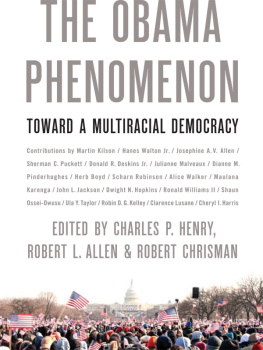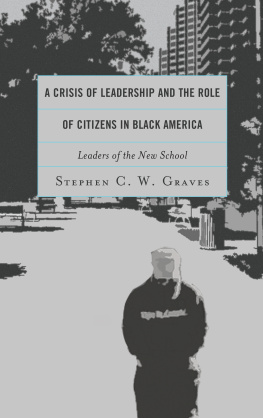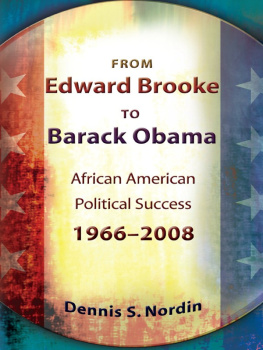Whose Black Politics?
The past decade has witnessed the emergence of a new vanguard in African American political leaders. They came of age after Jim Crow segregation and the Civil Rights Movement, they were raised in integrated neighborhoods and educated in majority white institutions, and they are more likely to embrace deracialized campaign and governance strategies. Members of this new cohort, such as Cory Booker, Artur Davis, and Barack Obama, have often publicly clashed with their elders, either in campaigns or over points of policy. And because this generation did not experience codified racism, critics question whether these leaders will even serve the interests of African Americans once in office.
With these pressing concerns in mind, this volume uses multiple case studies to probe the implications of the emergence of these new leaders for the future of African American politics. Editor Andra Gillespie establishes a new theoretical framework based on the interaction of three factors: black leaders crossover appeal, their political ambition, and connections to the black establishment. She sheds new light on the changing dynamics not only of Black politics but of the current American political scene.
Andra Gillespie is Assistant Professor of political science at Emory University, where she teaches courses in African American politics, political participation, and experimental methods.
Whose Black Politics?
Cases in Post-Racial Black Leadership
Edited by
Andra Gillespie

NEW YORK AND LONDON
First published 2010
by Routledge
270 Madison Avenue, New York, NY 10016
Simultaneously published in the UK
by Routledge
2 Park Square, Milton Park, Abingdon, Oxon OX14 4RN
Routledge is an imprint of the Taylor & Francis Group, an informa business
This edition published in the Taylor & Francis e-Library, 2009.
To purchase your own copy of this or any of Taylor & Francis or Routledges collection of thousands of eBooks please go to www.eBookstore.tandf.co.uk.
2010 Taylor & Francis
All rights reserved. No part of this book may be reprinted or reproduced or utilised in any form
or by any electronic, mechanical, or other means, now known or hereafter invented, including
photocopying and recording, or in any information storage or retrieval system, without permission
in writing from the publishers.
Trademark Notice: Product or corporate names may be trademarks or registered trademarks, and
are used only for identification and explanation without intent to infringe.
Library of Congress Cataloging in Publication Data
Gillespie, Andra.
Whose Black politics? : cases in post-racial Black leadership / Andra Gillespie.
p. cm.
Includes bibliographical references and index.
1. African American leadershipCase studies. 2. African AmericansPolitics and
governmentCase studies. 3. African American politiciansCase studies. 4. African
AmericansRace identityCase studies. 5. Post-racialismUnited StatesCase studies.
6. United StatesRace relationsPolitical aspectsCase studies. 7. African Americans
History1964 8. United StatesPolitics and government1989 I. Title.
E185.615.G535 2009
323.1196073dc22
2009025521
ISBN 0-203-89372-7 Master e-book ISBN
ISBN 10: 0-415-99215-X (hbk)
ISBN 10: 0-415-99216-8 (pbk)
ISBN 10: 0-203-89372-7 (ebk)
ISBN 13: 978-0-415-99215-2 (hbk)
ISBN 13: 978-0-415-99216-9 (pbk)
ISBN 13: 978-0-203-89372-2 (ebk)
To the trailblazers in our discipline: Ralph Bunche and Jewel Limar Prestage
To the innovators in our specialty: Michael Dawson, Charles Hamilton, Robert Smith, Ronald Walters, Michael Preston, Paul Puryear, Lenneal Henderson, Georgia Persons, and Huey Perry
And to our many mentors: Sharon Wright Austin, Cathy Cohen, Donald Green, Michael Jones-Correa, Eric Mark Kramer, Paula McClain, Joseph McCormick II, Cheryl Miller, Dianne Pinderhughes, Randall Strahan, and Linda Faye Williams
Contents
ANDRA GILLESPIE
|
ANDRA GILLESPIE
|
ANDRA GILLESPIE AND EMMA TOLBERT
|
ANDRA GILLESPIE
|
RANDOLPH BURNSIDE AND ANTONIO RODRIGUEZ
|
ATHENA KING, TODD SHAW, AND LESTER SPENCE
|
LORRIE FRASURE
|
CHARLTON MCILWAIN
|
ANGELA K. LEWIS
|
RACHEL YON
|
SEKOU FRANKLIN
|
TYSON D. KING-MEADOWS
|
ANDRA GILLESPIE AND AMBER PEREZ
|
KATRINA GAMBLE
|
ANDRA GILLESPIE
|
List of Tables and Figures
Tables
1.1 | Typologies of Third Phase Black Politicians |
1.2 | Approximate Typology of Selected Phase 2.5 Black Politicians |
2.1 | Weighted Demographics From Artur Daviss Internal Polls |
2.2 | Earl Hilliards Election Performance 19921998 |
2.3 | Conjoint Analysis Ranks for Voter Opposition in the 2002 Alabama 7th District Primary |
2.4 | Racial Composition of Proposed Alabama Congressional Districts, 2002 |
2.5 | Bivariate Analysis of the Relationship between District Tenure and Candidate Favorability/ Preference, Alabama 7th District |
2.6 | Bivariate Analysis of the Relationship between District Tenure* Race and Candidate Favorability/ Preference, Alabama 7th District |
2.7 | June 2002 Runoff Election Results by New/Old District, Alabama 7th District |
3.1 | Turnout Rates By Ward, 2006 Newark Municipal Election |
4.1 | Democratic Primary Results 1995 Special Election, Illinois 2nd District |
4.2 | Jesse Jackson Jr.s Bill Sponsorship from the 104th to 110th Congress |
4.3 | Percentage of Jesse Jacksons Co-sponsored Legislation with Black Congress Members |
5.1 | Detroit Population and Economic Changes |
5.2 | Detroit Community Development Block Grant Budget Analysis, 20062007 FY |
6.1 | Percent of Democratic Primary Likely Voters for Barack Obama, 2004 |
6.2 | Logit Model of Likelihood of Intention to Vote for Barack Obama, 2004 |
7.1 | Democratic Presidential Candidate Leadership, Experience, and Favorability Ratings, January 2007May 2008 |
7.2 | Selected Experience Model Ratings by Race, 2008 Democratic Presidential Primary |
7.3 | Selected Experience Model Ratings, 2008 Democratic Presidential Primary [Trust in Crisis/Best Commander-in-Chief] |












